For a while we wandered aimlessly, looking for anyone who resembled Miss Wren, or anywhere it seemed peculiars were likely to hide. But everything here seemed peculiar—this entire loop, with all its chaotic strangeness, was perfect camouflage for peculiars. And yet, even here, people noticed us, their heads turning subtly as we passed. I started to get paranoid. How many of the people around us were spies for the wights—or wights themselves? I was especially wary of the clown, the one Bronwyn had pulled Olive away from. He kept turning up. We must’ve passed him five times in as many minutes: loitering at the mouth of an alley, staring down from a window, watching us from a tented photo booth, his mussed hair and horrific makeup clashing bizarrely with a backdrop painting of bucolic countryside. He seemed to be everywhere at once.
“It’s not good being out in the open like this,” I said to Emma.
“We can’t just circle around forever. People are noticing us. Clowns.”
“Clowns?” she said. “Anyway, I agree with you—but it’s difficult to know where to start in all this madness.”
“We should start at what is always the most peculiar part of any carnival,” said Enoch, butting between us. “The sideshow.” He pointed at a tall, gaudy facade at the edge of the square. “Sideshows and peculiars go together like milk and cookies. Or hollows and wights.”
“Usually they do,” said Emma, “but the wights know that as well. I’m sure Miss Wren hasn’t kept her freedom this long by hiding in such obvious places.”
“Have you got a better idea?” said Enoch.
We didn’t, and so we shifted direction toward the sideshow. I looked back for the leering clown, but he had melted into the crowd.
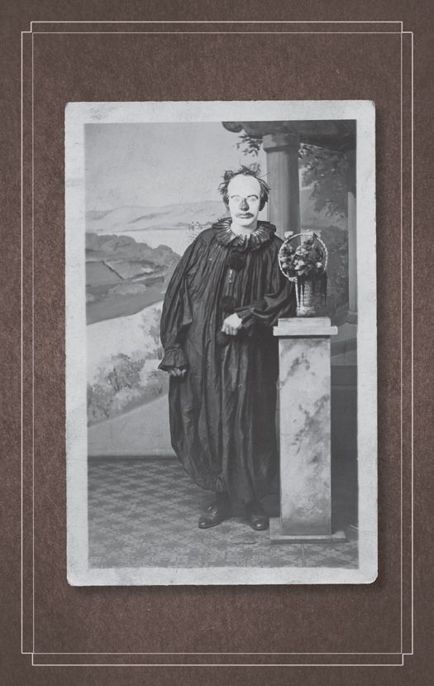
At the sideshow, a scruffy carnival barker was shouting through a megaphone, promising glimpses of “the most shocking errors of nature allowed on view by law” for a trivial fee. It was called the Congress of Human Oddities.
“Sounds like dinner parties I’ve attended,” said Horace.
“Some of these ‘oddities’ might be peculiar,” said Millard, “in which case they might know something about Miss Wren. I say it’s worth the price of admission.”
“We don’t have the price of admission,” said Horace, pulling a single, lint-flecked coin from his pocket.
“Since when have we ever paid to get into a sideshow?” said Enoch.
We followed Enoch around to the back of the sideshow, where its wall-like facade gave way to a big, flimsy tent. We were scouting for openings to slip through when a flap pulled back and a well-dressed man and woman burst out, the man holding the lady, the lady fanning herself.
“Move aside!” the man barked. “This woman needs air!”
A sign above the flap read: PERFORMERS ONLY.
We slipped inside and were immediately stopped. A plain-looking boy sat on a tufted stool near the entrance, apparently in some official capacity. “You performers?” he said. “Can’t come in ’less you’re performers.”
Feigning offense, Emma said, “Of course we’re performers,” and to demonstrate, she made a tiny flame on the tip of her finger and stubbed it out in her eye.
The boy shrugged, unimpressed. “Go on, then.”
We shuffled past him, blinking, our eyes adjusting slowly to the dark. The sideshow was a low-ceilinged maze of canvas—a single, dramatically torchlit aisle that took sharp turns every twenty or thirty feet, so that around each corner we were confronted by a new “abomination of nature.” A trickle of spectators, some laughing, others pale and shaking, stumbled past us in the opposite direction.
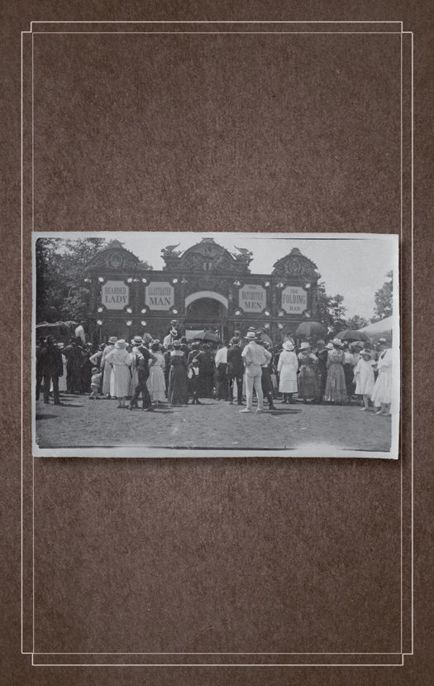
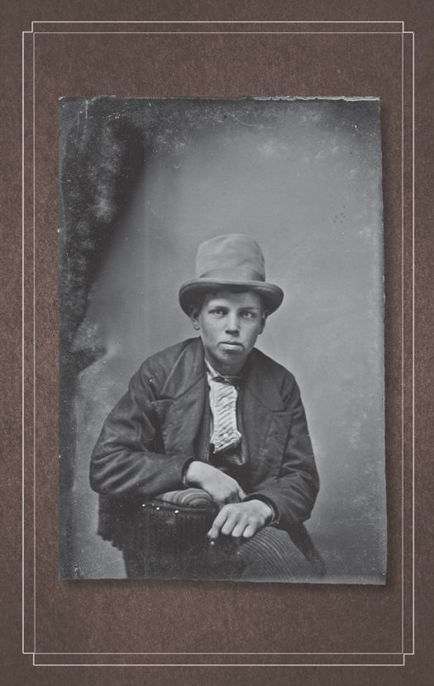
The first few freaks were standard-issue sideshow fare, and not especially peculiar: an “illustrated” man covered in tattoos; a bearded lady stroking her long chin-whiskers and cackling; a human pincushion who pierced his face with needles and drove nails into his nostrils with a hammer. While I thought this was pretty impressive, my friends, some of whom had traveled Europe in a sideshow with Miss Peregrine, could hardly stifle their yawns.
Under a banner that read THE AMAZING MATCHSTICK MEN, a gentleman with hundreds of matchbooks glued to his suit body-slammed a man similarly clothed in matchsticks, causing flames to erupt across the matchstick man’s chest as he flailed in fake terror.
“Amateurs,” Emma muttered as she pulled us on to the next attraction.
The oddities got progressively odder. There was a girl in a long, fringed dress who wore a giant python around her body, which wriggled and danced at her command. Emma allowed that this was at least marginally peculiar, since the ability to enchant snakes was something only syndrigasti could do. But when Emma mentioned Miss Wren to the girl, she gave us a hard stare and her snake hissed and showed its fangs, and we moved on.
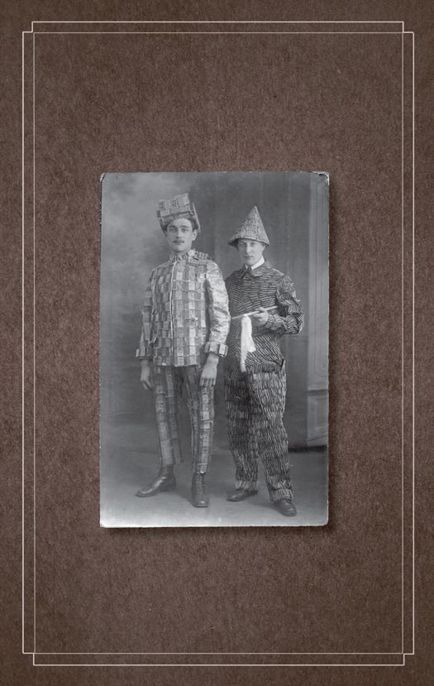
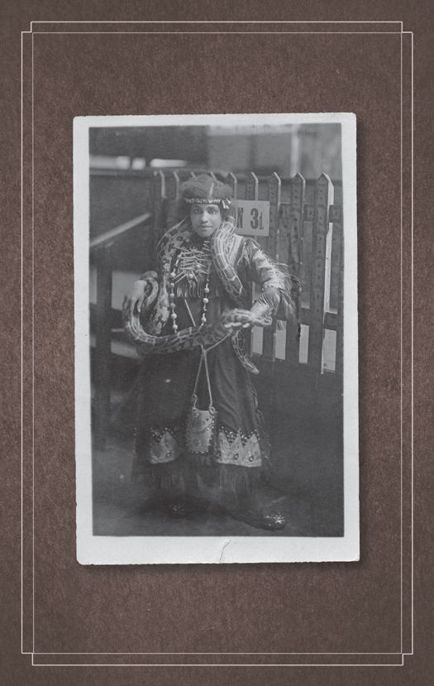
“This is a waste of time,” said Enoch. “Miss Peregrine’s clock is running out and we’re touring a carnival! Why not get some sweets and make a day of it?”
There was only one more freak to see, though, so we continued on. The final stage was empty but for a plain backdrop, a small table with flowers on it, and an easel-propped sign that read: THE WORLD-FAMOUS FOLDING MAN.
A stagehand walked onto the stage lugging a suitcase. He set the case down and left.
A crowd gathered. The suitcase sat there, center stage. People began to shout, “On with the show!” and “Bring out the freak!”
The suitcase jiggled. Then it began to shake, wobbling back and forth until it toppled onto its side. The crowd pressed toward the stage, fixated on the case.
Its latches popped, and very slowly, the case began to open. A pair of white eyes peeped out at the crowd, and then the case opened a little more to reveal a face—that of an adult man, with a neatly trimmed mustache and little round glasses, who had somehow folded himself into a suitcase no larger than my torso.
The crowd burst into applause, which increased as the freak proceeded to unfold himself, limb by limb, and step out of the impossibly small case. He was very tall and as skinny as a beanpole—so alarmingly thin, in fact, that it looked as if his bones were about to break through his skin. He was a human exclamation point, but carried himself with such dignity that I couldn’t laugh at him. He studied the hooting crowd dourly before taking a deep bow.
He then took a minute to demonstrate how his limbs could bend in all sorts of exotic ways—his knee twisting so that the top of his foot touched his hip, then his hips folding so that the knee touched his chest—and after more applause and more bows, the show was over.
We lingered as the crowd filtered away. The folding man was leaving the stage when Emma said to him, “You’re peculiar, aren’t you?”
The man stopped. He turned slowly to look at her with an air of imperious annoyance. “Excuse me?” he said in a thick Russian accent.
“Sorry to corner you this way, but we need to find Miss Wren,” Emma said. “We know she’s here someplace.”
“Peh!” said the man, dismissing her with a noise halfway between laughing and hawking spit.
“It’s an emergency!” Bronwyn pleaded.
The folding man crossed his arms in a bony X and said, “I dunno anything what you say,” then walked off the stage.
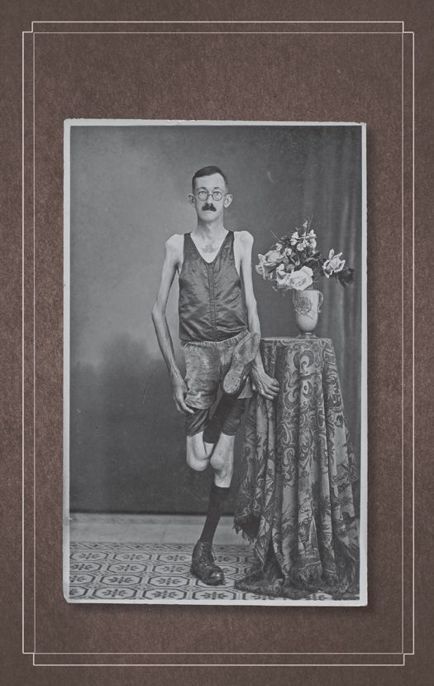
“Now what?” asked Bronwyn.
“We keep looking,” said Emma.
“And if we don’t find Miss Wren?” said Enoch.
“We keep looking,” Emma said through her teeth. “Everyone understand?”